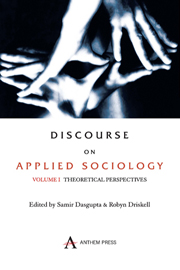Book contents
- Frontmatter
- Contents
- Preface and Acknowledgement
- Contributors to this Volume
- List of Abbreviations
- Introduction
- 1 Re-Orient World History, Social Theory and the Nineteenth Century
- 2 The Unique Complexity of Social Phenomena and the Uses of Social Science Knowledge
- 3 Unlimited Love, Compassion and Forgiveness: Acts of Moral Examplars
- 4 Theoretical Application
- 5 Applied Sociology's Need to Rethink the Tradition: Sociological Theorizing in a Global Framework
- 6 Social Analysis and Social Action
- 7 The Applied Sociologist as Craftsman
- 8 Applied Sociologists: Its Problems and Prospects
- 9 Sociology and its Application in Society: Giving Sociology its ‘Working’ Meaning
- 10 The Evolution of Sociology Back to its Applied Future
- 11 Contemporary Corporate Crime: Theoretical Perspectives, Cases & Consequences
- Index
3 - Unlimited Love, Compassion and Forgiveness: Acts of Moral Examplars
Published online by Cambridge University Press: 05 March 2012
- Frontmatter
- Contents
- Preface and Acknowledgement
- Contributors to this Volume
- List of Abbreviations
- Introduction
- 1 Re-Orient World History, Social Theory and the Nineteenth Century
- 2 The Unique Complexity of Social Phenomena and the Uses of Social Science Knowledge
- 3 Unlimited Love, Compassion and Forgiveness: Acts of Moral Examplars
- 4 Theoretical Application
- 5 Applied Sociology's Need to Rethink the Tradition: Sociological Theorizing in a Global Framework
- 6 Social Analysis and Social Action
- 7 The Applied Sociologist as Craftsman
- 8 Applied Sociologists: Its Problems and Prospects
- 9 Sociology and its Application in Society: Giving Sociology its ‘Working’ Meaning
- 10 The Evolution of Sociology Back to its Applied Future
- 11 Contemporary Corporate Crime: Theoretical Perspectives, Cases & Consequences
- Index
Summary
We must develop and maintain the capacity to forgive. He who is devoid of the power to forgive is devoid of the power to love. There is some good in the worst of us and some evil in the best of us. When we discover this, we are less prone to hate our enemies.
Martin Luther King Jr.This research is an exploratory study that addresses the relationship between altruism, empathy and forgiveness. We hypothesize that respondents who score high on measures of altruism, spirituality/ religiosity, empathy, social responsibility, moral identity and selfesteem are more likely to be forgiving and helpful in nature. A second hypothesis is that respondents who score high on those same measures and who have been hurt or offended in some serious way will be more likely to forgive those who have harmed them. We have reasoned that respondents who receive high scores and who have been hurt or offended would be more altruistic and empathetic towards the harmdoers; this was confirmed by our data.
To test these assumptions, we gathered responses from 435 people, including moral exemplars, members of clergy, college students and the general population. Some of the data was obtained by interviewing a sample of respondents, while other respondents completed a selfadministered questionnaire. All of the respondents completed a forgiveness scale. We began this research by interviewing a sample of moral exemplars to explore their motivations for showing compassion and acts of kindness.
- Type
- Chapter
- Information
- Discourse on Applied SociologyTheoretical Perspectives, pp. 99 - 124Publisher: Anthem PressPrint publication year: 2007



